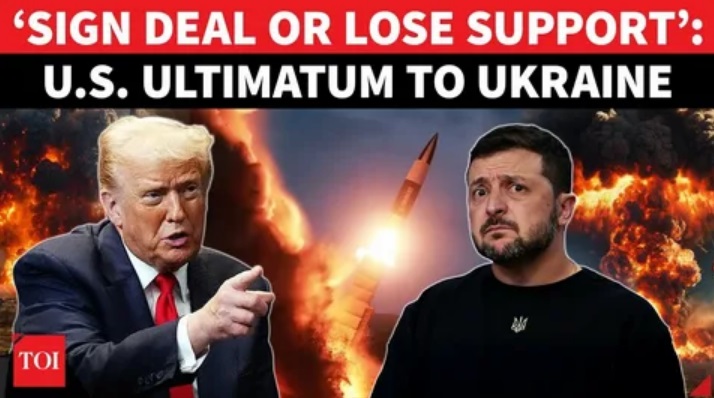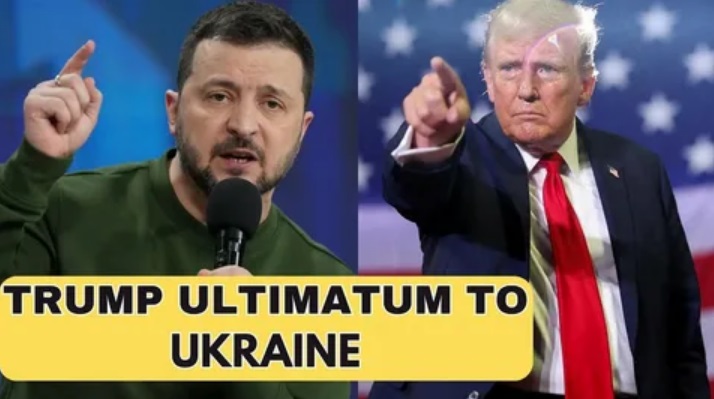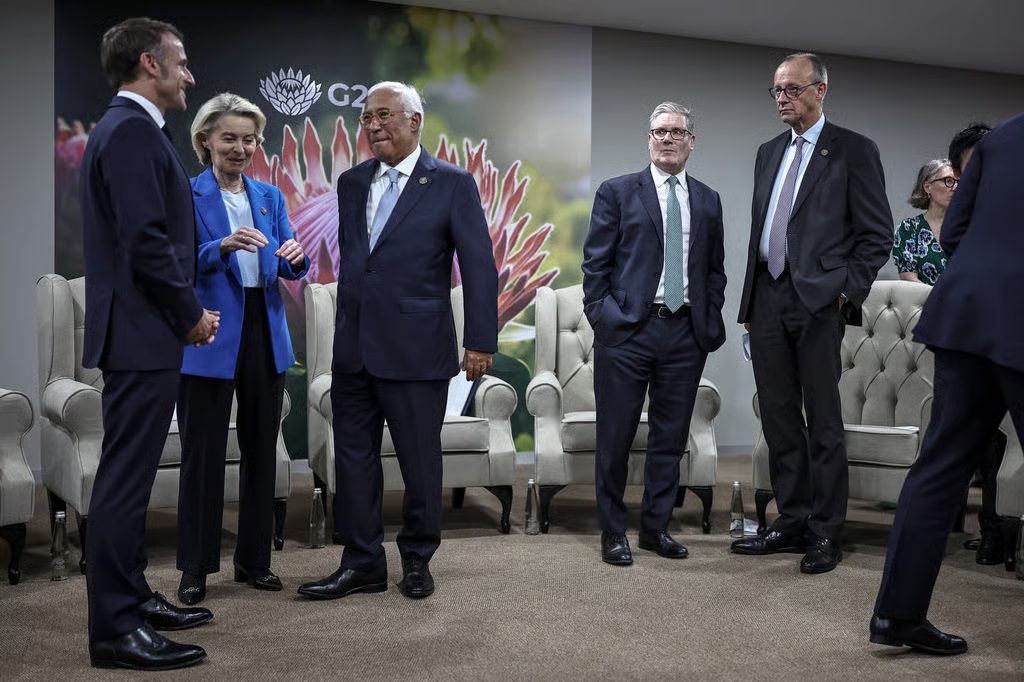
The U.S. is sending “signals” that everything could be off the table if Kyiv does not quickly sign a proposal, which was drawn up by special envoy Steve Witkoff, ‘The Washington Post’ writes.
The White House is pressuring Ukraine to sign on to its new peace proposal by Thanksgiving or lose U.S. support in its war with Russia, according to five people familiar with the talks.
U.S. Army Secretary Daniel Driscoll presented Ukrainian President Volodymyr Zelensky on Thursday with a version of the 28-point.
That plan, leaked to the news media and confirmed by several officials, includes several red lines for Ukraine, including a significant reduction of its army size and ceding territory to Russia that Moscow has not conquered militarily.
Speaking from the Oval Office on Friday, Trump said that Zelensky will eventually have to accept a deal.
“He’ll have to like it. And if he doesn’t like it, then they should just keep fighting, I guess,” Trump said.
Asked whether the White House was going to cut off U.S. support for Ukraine if Kyiv doesn’t sign on to the proposal, Trump declined to answer directly. But he said that “at some point he’s going to have to accept something, and he hasn’t accepted. You remember, right in the Oval Office, not so long ago, I said, ‘You don’t have the cards.’”
Trump earlier told Fox News Radio on Friday that next Thursday would be “appropriate” to reach agreement on the proposed deal.
Russian President Vladimir Putin told a meeting of his security council Friday that the new peace plan could serve “as the basis for a final peace settlement,” though he claimed that the U.S. had not yet discussed the proposal in detail with Russia. “Russia is ready for peace talks and peaceful resolution of problems. But this requires, of course, a substantive discussion of all the details of the proposed plan,” Putin said.
A senior European diplomat diplomat involved in the discussions said Ukraine is under “extraordinary pressure” to agree to a deal. A separate person said that while Washington’s vow to withdraw support from Kyiv is real, it probably would not be implemented for another two weeks at the earliest.
Trump was focused on a speedy resolution to the conflict but was willing to accept negotiations over the proposal, a person familiar with the call said.
Kyiv has long feared any arrangement that would force it to reduce its army and cede its most fortified territory in Donetsk, as that would give Moscow an upper hand territorially and militarily.
Analysts said aspects of the latest plan forwarded by the U.S. would also probably be unacceptable to Russia. “Although the concessions to Russia appear substantial, the plan would also require Moscow to abandon some of its earlier conditions — for example, the more radical reduction of Ukraine’s armed forces or parts of the political reform package,” said Tatiana Stanovaya, a senior fellow with the Carnegie Russia Eurasia Center. “Having received, in outline, much of what it wanted, Moscow now has to treat seriously something it is likely to view as fundamentally unsubstantiated and unreliable.”
 Photo: You Tube
Photo: You Tube
Can Trump’s 28-point peace plan for Ukraine work — or is it a trap?
A 28-point plan for peace. It is an outline more than a finished document, and it is hard to describe it as a fair one, but its supporters hope it could represent the basis for an end to the war in Ukraine.
Trump is demanding a reply by Thursday.
The current version of the plan reads oddly and is full of anomalies and ambiguities — it was certainly not drafted by diplomats or pedants. It refers to superseded treaties like the Strategic Arms Reduction Treaty (Start 1) nuclear deal, leaves crucial issues unexplained, and even talks about Washington mediating talks between Russia and Nato as if America were not a member of the alliance, a ‘Times’ prominent observer Mark Galeotti writes.
It also blithely assumes that where Russia and the US lead, everyone else must follow. It envisages Russia being invited back into the G8 bloc of industrial nations, which is something on which all members need to vote, and a staged lifting of sanctions — even though the European Union and individual states have their own set of restrictions on Russia.
Yet this is not thought of as a final document, more the agenda for future discussion.
Ukraine is expected to make a series of concessions, some inevitable, others painful. Most of the occupied territories will remain in Russian hands, but without formal recognition. Given that even Ukraine’s most outspoken backers admit, at least in private, that for the foreseeable future they are not going to be liberated, this is no great stretch.
Besides, with America already withdrawing almost all military and financial aid, Europe will struggle to cover the €70 billion (£61.6 billion) Ukraine will need for the coming year given its own rearmament and economic development programmes.
In these circumstances, while Ukrainians may feel the plan’s proposals offer too many gifts to Putin, some Russian hawks are already describing it as too little, too late. “Russia needs the complete elimination of the Kyiv regime by any means necessary,” trumpeted the nationalist Tsargrad news site last week.
This helps to explain why Putin is still being cagey. He claimed to his top security officials that he was willing to be “flexible” and was waiting for Kyiv to respond. He tried to play down the prospects, though, observing that “apparently, Ukraine and its European allies are still deluded and dream of inflicting a strategic defeat on Russia on the battlefield”.
Zelensky is in a tough spot. The whole plan could be a trap, intended to provoke a Ukrainian refusal and give Trump an alibi. He could then claim he had done his best, secured a wonderful deal, but that Kyiv was simply not willing to end the war. Trump could then walk away from a conflict that has become an embarrassment, given his campaign trail promise to secure peace in the first 24 hours of his presidency.
If he walks away, the likelihood is that this would also mean the end of remaining US assistance, from intelligence-sharing — a great help to Ukraine’s long-range strikes and air defence — to the Prioritised Ukraine Requirements List process, which grants European states greater opportunities to buy equipment to pass on to Kyiv.
Even if the deal is meant sincerely, Zelensky’s options are increasingly curtailed as he is facing the most serious political challenge of his presidency. A corruption scandal involving more than £76 million has sent one of Zelensky’s closest friends fleeing the country and two ministers dismissed. Pressure is growing on his powerful chief of staff, Andriy Yermak, whom some call the “shadow prime minister” because of his influence in the government. As one Ukrainian political insider put it, “if Yermak goes, then Zelensky loses his strong right arm”.
Opinion in Kyiv is split as to whether a weakened president is less able to resist US pressure to accept a deal or, conversely, if he then lacks the strength to make one stick. Again, to quote one insider: “It’s not impossible we get the worst of both worlds: Zelensky compromises himself by accepting Trump and Putin’s terms, but he’s then pushed out and we end up with no deal, no US support, and nothing to stop the Russians.”
The document is not final. Even Putin has said that it only represents “the basis of a final peace settlement”. Sloppy formulations need to be sharpened, broad assertions defined and details addressed.
Europe would have to agree commitments to a reconstruction project that has a characteristically Trumpian clause that envisages half of all “profits” reverting to the US. The other G7 nations, which include Japan and Canada, will have to let Russia back into the club. Ukraine will still have not just a voice but a veto on everything that is decided.
So this is no more than, perhaps, the beginning of the end. Meanwhile, though, the war continues, with Russian pushes towards Hulyaipole in the south and Kupyansk in the north and further attacks on the energy network. A growing fear is that once true winter hits, Moscow will strike at the largest electric substations linking the regional power networks for an even more devastating blow.
As one Ukrainian official sighed: “Between Trump and Putin, our enemies have us trapped.”
 European luck. The Europeans will get seats at the negotiating table. They had been shut out of the most recent U.S. peace drive until now, like puppies.
European luck. The Europeans will get seats at the negotiating table. They had been shut out of the most recent U.S. peace drive until now, like puppies.
Photo: WPA via Getty Images
Europeans finally get seat at Trump’s table for Ukraine peace talks
The European Union and the U.K. will take part in high-level talks on Donald Trump’s peace plan for Ukraine, in a significant breakthrough for Brussels and London, which had been shut out of the process until now.
Top security officials from France and Germany will also attend the negotiations, likely to take place in Switzerland, a senior European official told POLITICO, as Ukraine’s allies seek to re-write Trump’s proposal which they fear would favor Russia.
The fact that the Europeans will get seats at the negotiating table will be welcomed in Kyiv, Brussels and beyond, after Ukraine’s allies voiced their concern at being excluded from Trump’s most recent initiative.
The talks will be held at the level of national security advisers, while Bjoern Seibert, the head of cabinet for European Commission President Ursula von der Leyen, is expected to represent the EU.
Among other points, the Europeans are expected to push Trump’s team to dilute their proposal for handing territory in the Donbas region of eastern Ukraine to Russia.
On Saturday, more than a dozen leaders — including Germany’s Friedrich Merz, France’s Emmanuel Macron, the U.K.’s Keir Starmer, the EU’s von der Leyen, Finland’s Alexander Stubb and Canada’s Mark Carney — met for an urgent discussion at the G20 summit in Johannesburg to coordinate their response to Trump’s plan with Ukrainian Zelenskyy.
The leaders are seeking to reassure Zelenskyy that they will stick by his side even if Trump does not. And their statement hinted at their displeasure at parts of the U.S. proposals that affect the EU and NATO, saying any such provisions would require proper “consent” from these bodies.
Speaking to reporters in South Africa, Merz, the German chancellor, raised the possibility of Ukraine collapsing. “Depending on how this war ends, it will have an impact on Europe’s security,” he said.
“If Ukraine loses this war and possibly collapses, it will have repercussions for European politics as a whole, for the entire European continent. That is why we are so strongly committed to this cause,” Merz said.
…Russia has been making incremental advances on the battlefield, far outmanning and outgunning the Ukrainian side, and experts say any deal signed now would give Russia a huge advantage while it has the upper hand, ‘The Washington Post’ stresses.
read more in our Telegram-channel https://t.me/The_International_Affairs

 11:06 24.11.2025 •
11:06 24.11.2025 •






















